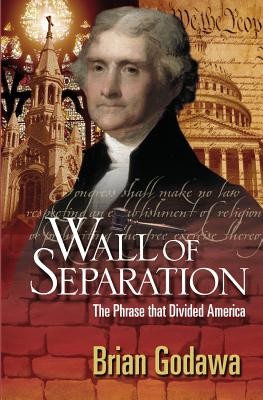
- We will send in 10–14 business days.
- Author: Brian Godawa
- Publisher: Warrior Poet Publishing
- ISBN-10: 1942858388
- ISBN-13: 9781942858386
- Format: 13.3 x 20.3 x 0.5 cm, softcover
- Language: English
- SAVE -10% with code: EXTRA
Reviews
Description
Freedom OF Religion or Freedom FROM Religion?
The "wall of separation" is a metaphor deeply embedded in the American consciousness, that continues to cause deep controversy within our country.
In this historical exploration, author Brian Godawa brings clarity to the debate by looking at what the Founding Fathers intended when they framed the Constitution and wrote the First Amendment Religious Clauses. Were they trying to create a Christian nation or a secular paradise?
The Original Intent of Thomas Jefferson's Infamous Phrase
An examination of the humble origins of the "wall of separation" in Thomas Jefferson's 1802 letter to the Danbury Baptists reveals a meaning quite different from the modern understanding, yet one that foreshadowed the ongoing debate of today.
Godawa shows that the Founders supported a deep influence of Judeo-Christian religion upon their governance, but one that did not establish a national denomination. This is completely misunderstood by modern secular and Anti-Christian interpreters.
The Supreme Court and the Twisting of Original Intent
Godawa takes a look at how that understanding of church and state relations has mutated through history by means of Supreme Court decisions and cultural pressures to create a secular society without religious influence.
From Everson vs. Board of Education to the most recent decisions over Ten Commandments displays, such interpretations are explored in comparison with the Founder's original intent.
- Author: Brian Godawa
- Publisher: Warrior Poet Publishing
- ISBN-10: 1942858388
- ISBN-13: 9781942858386
- Format: 13.3 x 20.3 x 0.5 cm, softcover
- Language: English English
Freedom OF Religion or Freedom FROM Religion?
The "wall of separation" is a metaphor deeply embedded in the American consciousness, that continues to cause deep controversy within our country.
In this historical exploration, author Brian Godawa brings clarity to the debate by looking at what the Founding Fathers intended when they framed the Constitution and wrote the First Amendment Religious Clauses. Were they trying to create a Christian nation or a secular paradise?
The Original Intent of Thomas Jefferson's Infamous Phrase
An examination of the humble origins of the "wall of separation" in Thomas Jefferson's 1802 letter to the Danbury Baptists reveals a meaning quite different from the modern understanding, yet one that foreshadowed the ongoing debate of today.
Godawa shows that the Founders supported a deep influence of Judeo-Christian religion upon their governance, but one that did not establish a national denomination. This is completely misunderstood by modern secular and Anti-Christian interpreters.
The Supreme Court and the Twisting of Original Intent
Godawa takes a look at how that understanding of church and state relations has mutated through history by means of Supreme Court decisions and cultural pressures to create a secular society without religious influence.
From Everson vs. Board of Education to the most recent decisions over Ten Commandments displays, such interpretations are explored in comparison with the Founder's original intent.


Reviews